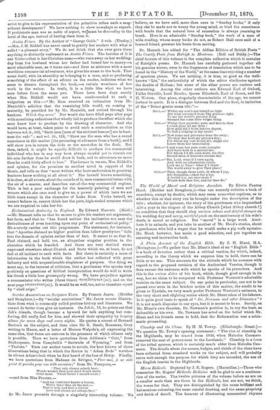Austin Friars. By the Author of "George Geith." 3 vols.
(Tinsley.) —Mrs. J. H. Riddell has never cared to gratify her readers with what is callel "a pleasant story." We do not think that she ever gave them anything so distinctly unpleasant as Austin Friars. The heroine of it is one Yorke—that is her Christian name—who runs away on her wedding- day from the husband whom her father had forced her to marry—a most admirable man, as it turns out—and lives as mistress with a most worthless commercial adventurer, who gives his name to the book. That name itself, with its absurdity as belonging to a man, and so producing something of the effect of an affront on the reader, indicates what we seem to discern throughout the book,—a certain weariness of her work in the writer. In truth, it is a little like what we have seen before from the same pen. There have been days surely when Mrs. Riddell would not have condescended to such a vulgarism as this :—" Mr. Ross received an intimation from Mr. Menteith's solicitor that the remaining bills would, on coming to maturity, be provided for by Mr. Menteith, and retired through his bankers. Which they were." Nor would she have filled page after page with moralizing reflections that wholly fail to produce the effect which she once knew how to produce by the drawing of character. And she would have, at least, taken pains to avoid such a contradiction as this between vol. ii., 265, "Such men [men of the strictest honour] aro in busi- ness the rule " ; and vol. iii., 124, "Show me the man who has a sound conscience in this matter [the procuring of advances from a bank], and I will show you in return the dodo or the mastodon in the flesh. But then, iadeed, it might be equally difficult to produce the commercial individual who has in any way been always careful not to stretch out his arm farther than he could draw it back, and to adventure no more than he could fairly afford to lose." The former is, we see, Mrs. Riddell's real opinion, for she promises us another novel in support of the thesis, and tells us that "most writers who have undertaken to pourtray business know nothing at all about it." She herself knows something, it is clear, at all events, about the outside of it, uses commercial terms with the air of a master, and describes out-of-the-way commercial regions. This is but a poor exchange for the masterly painting of men and women which she once used to give us, a power of which here we see little trace except in the character of Luke Ross. Yorke herself, we cannot believe in, cannot think her the pure, high-souled creature which we are required to take her for.


































 Previous page
Previous page